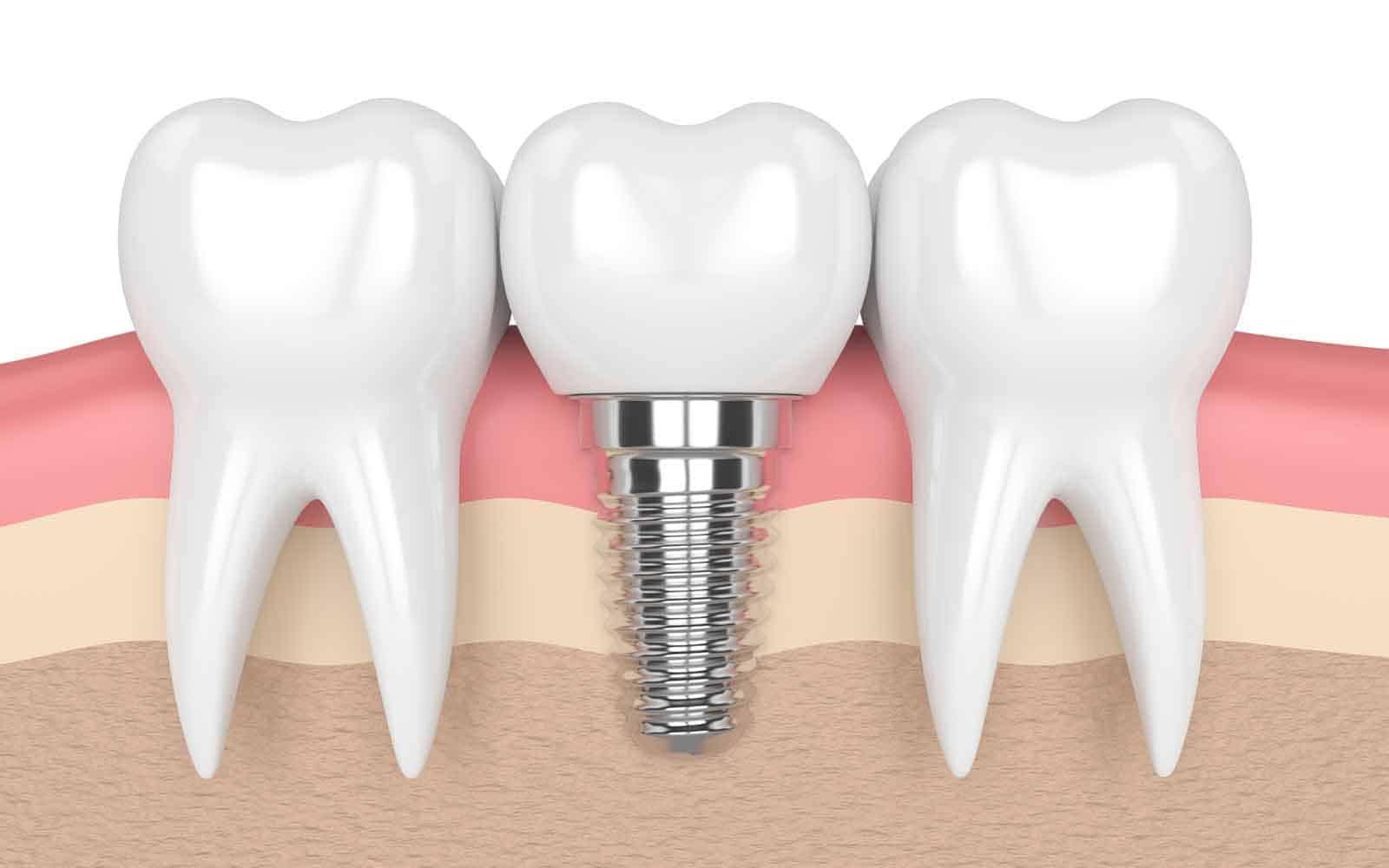What is an implant tooth?
An implant tooth is an artificial tooth root that is prepared by using titanium metal, which is usually the most compatible compound with the human body, in order to replace missing teeth. Implants placed inside the jawbone perform all functions such as chewing, crushing, and at the same time create a beautiful aesthetic image. It can be done to replace previously lost teeth, as well as it can be placed after tooth extraction if there is no condition such as infection, inflammation.
The purpose of implant treatment is to create usable teeth on the jawbone. The lack of teeth in individuals has a separate importance in the field of dentistry for health and aesthetic reasons. Implants are created for the construction of fixed or movable prostheses under conditions where bone tissue is suitable and sufficient. If the patient's bone density and fitness are not at a sufficient level, it may be necessary to conduct studies aimed at creating bone in the mouth before the procedure is performed. This procedure is called a bone graft. In other words, it is a procedure performed to reconstruct the missing part of the lower or upper jaw bone. Our goal here is to re-strengthen and repair the bone tissue that is weak.
implant dental treatment
The Importance of Implant Dental Treatment
In case of tooth loss, patients usually look at this situation with an aesthetic eye. But considering a long-term oral and physical health, the lack of an individual's teeth can also lead to very different health problems. With the awareness of oral and dental care, it is of great importance that this treatment is carried out without wasting time. In order to eliminate the risk of dental-related health problems, implant dental treatment, which is close to natural teeth in appearance and provides long-lasting results, is preferred by our patients.
In the early 1950s, the Swedish inventor and doctor Thu-Ingvar Brånemark accidentally realized that titanium fuses with bones in an extremely suitable way as a result of microscopic studies he conducted on rabbit bones. At the end of the last 10 years, implant treatment was started to be applied to patients in the 60s. Implant treatment has passed through many stages since the 1950s to the present day and has taken its final form, so to speak, mouth-friendly with its current use.
Characteristics of Dental Implants
In case of tooth loss and after tooth extraction, implant dental application, which is a treatment method suitable for the natural tooth structure and has a high success rate, is performed. The implant tooth, which we can recommend to our patients for single tooth loss, partial tooth loss or total tooth loss, restores patients to health in the harmony of titanium with the dental bone. If we list the main features of the dental implant;
As with your teeth that come with childbirth, it can comfortably perform all functions such as eating, drinking, chewing, crushing and plucking comfortably without any difficulty,
Prevention of bone loss and easy provision of oral hygiene,
Preserving the naturalness of speech, the sounds coming out of the mouth are not distorted in any way,
Obtaining an aesthetic image in a short time without disturbing the mouth and facial structure in any way,
Eliminating the problems of loss and wear of soft tissues caused by tooth loss over time,
To be equal in durability and structure to human life,
The success of the feedback in the patient satisfaction evaluations made,
Who is the Implant Suitable for?
The success of implant dental treatment in general depends on the density of the jawbone, the body's acceptance of implants and the dentist's experience. For this reason, when treatment is performed, the patient's bone density and whether bone development has been completed are considered, not the size of the tooth deficiency.
There are no upper age restrictions on implants known for their durability and long-term use. Unless there is a special case, all patients who have completed the age of 18, that is, have completely completed the stage of bone development, can opt for this treatment. Apart from all these, patients with advanced diabetes(uncontrolled diabetes), heart diseases and blood clotting problems should definitely get approval from the physicians of the relevant branches before the procedure.
Is there pain during dental transplantation(implant) treatment ?
The implant operation is performed under local anesthesia in a clinical setting. The operation is completed without the patient feeling pain and soreness during the procedure. After the operation, the patient should definitely follow the recommendations of the dentist. This is important for the patient to get through the postoperative period without experiencing the least pain and problems. During this time, the patient continues his daily life normally. It is possible that pain may occur sometimes during the one or two day period following the operation. You can easily get over this with the pain relief given by your dentist.
The Concept of Osseointegration and Dental Implant
Osseointegration means that the implant placed in the jawbone is completely wrapped with bone, in other words, the bone completely accepts the implant. In order for dental implants to be considered successful, it is necessary to exhibit a healthy and strong posture towards all functions such as chewing, crushing, plucking. This depends on the compatibility of the implants with the jawbone. For the osseointegration period, depending on the patient's bone density and structure, the type of operation, the patient's age and health status, and the region where the operation is performed, it may be necessary to wait for a period of at least 2.5, 3 months, or at most 6 or 7 months. At the end of this period, the necessary prosthetic procedures are performed.
How is an Implant Tooth Made ?
An implant tooth is the name given to a dental October technique applied to patients with one or more tooth losses. These teeth give results in the appearance of natural teeth both in terms of functionality and appearance. The reason for this is that it is directly connected to the jawbone and gets its power of use from here. To briefly summarize this application; an implant slot is created in the jawbone under the gum. This nest is the width that the tooth root can fit inside. After the nest is created, the gum returns to its former state again and the jawbone is expected to accept the implant. So the implant needs to boil. In jaw bones that do not have sufficient productivity, grafts should be performed to increase the bone ratio and strengthen the bone. Two or three months are needed for the graft to be successful and integrate.
Implant therapy is a treatment that is easy and practical in practice, but requires experience and knowledge in the technical part. The patient who decides to have an implant completes the procedures gradually and within a certain period of time, depending on the dentist, and then regains his new teeth.
Many factors such as the patient's choice of implant, the application of the implant to the tooth, the strengthening of the dental bone, the choice of implant type are sensitive issues that need to be handled carefully. The experience of the dentist performing the procedure in this regard is directly proportional to the success of the treatment. According to this information, implant treatment is not a short-term solution, but the basis of oral and dental health that will last for many years.
4 Important factors for a successful implant;
The expected result in implant treatment is to achieve a natural appearance and full functionality. When viewed from the outside, the ability to perform all the mechanics that natural teeth have with a neat and beautiful appearance reveals the success of this treatment. There are 4 important points to be considered in order to obtain results that satisfy the patient during the treatment process.
The surgical skill and experience of the dentist; Dental implant, unlike other dental treatments, can be evaluated by the number of operations performed by the dentist and his experience in this field. The person who will perform this treatment is a dentist, and all factors are important, from the training he has received to how many times he has performed this operation before.
The effect of the dental clinic; The cleanliness of the clinic where the procedure will be performed, the knowledge and experience of the assistant dental technicians who will be involved in the operation, the quality of the equipment used and the extent to which hygiene requirements are complied with greatly affect the success of the implant.
Bone quality and structure that the patient has; Information about bone density and structure is given to the patient by the dentist before this treatment is applied. Because the ratio of bone tissue in each person differs. Under certain conditions, a procedure to increase bone density can be performed before implant treatment. Because the quality and density of the bone are important for the process infrastructure.
Hygiene and care after treatment; After the implant procedure is completed, the prostheses should be properly brushed at least twice a day. Dental floss may be preferred to remove food residues accumulated on the prosthesis or between them. Decongestant dental floss may be preferred. In terms of ensuring complete oral hygiene, the use of mouthwash is recommended.
Is Implant Treatment Expensive?
One of the most curious issues about implant treatment is its cost. This treatment, which seems expensive to some patients at first glance, is actually clearly necessary when considering the quality of life and health. Considering the role that teeth take in oral digestion and their aesthetic appearance, it is revealed that they are important in the patient's
life in all aspects. The lack of teeth is a big problem in people's lives and they should be treated quickly because of the possibility of leading to more complicated problems in the future(heart diseases, digestive disorders).
How long is the Life of the treatment ?
Considering that the patient does not have any known serious health problems and that the implants are made with the appropriate material and a good brand, the service life is unlimited. The implant treatments applied by the dentist maintain their permanence as a lifelong procedure. What should be noted by the patient here is that oral hygiene rules play an effective role in the duration of implant use. As is usually the case, problems can occur in the mouth and teeth without maintenance. It is a dental metal titanium metal that has its own length and quality of dental life. Titanium implants observed around the world are looked at with a lifetime view, it is known that this procedure has a high success rate.
Do Implants Have Negative Health Effects?
Implants can cause pain for some time after they are inserted into the jawbone. This is a natural condition that occurs during the normal process of the procedure and at the stage when the jawbone accepts implants. The use of titanium implants increases both the success rate and makes it easier for the bone to accept implants. Unknown clinics and inexperienced doctors can also use materials made of some different metals other than titanium. Unfortunately, this can trigger a person's metal allergy and cause the bone to refuse the procedure. For this reason, the implant procedure, as with other dental treatments, should be performed under the supervision of an experienced dentist and with the appropriate product. Above all, the implant is not a harmful structure anyway, on the contrary, it is a safe way to protect human health and use teeth efficiently.
Another important issue is the harm of using cyanide during the implant process. (Cyanide is definitely not used in hospitals because of its harm to human health, it has been reported to be used in under-stairs clinics.) The implant metal has a property that does not carry the risk of cancer on its own. Only the patient needs to have the procedure in a modern clinic accompanied by dentists. As a result of the treatment, the patients' comments are positive and indicate the contributions of implant(dental transplantation) treatment in their own lives.
Does the implant Smell ?
Bad breath occurs due to smoking, caries and bacterial causes. Considering that individuals do daily personal care and there are no bruises in their mouths, the implant never causes bad breath and similar conditions.



